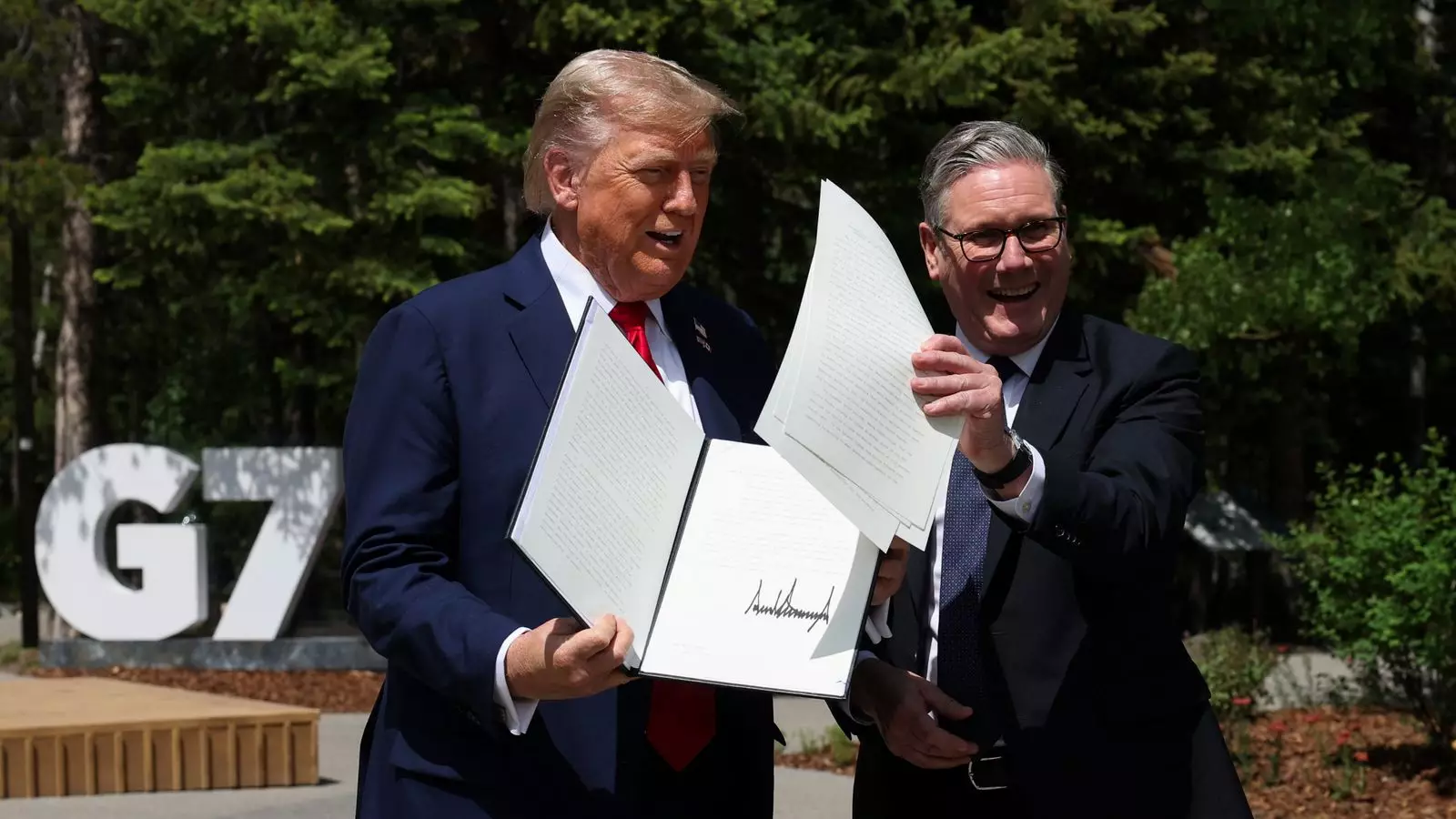The recent signing of the UK-US trade deal, hailed by its proponents as a momentous occasion, resting on the shoulders of high praise from US President Donald Trump and UK Prime Minister Sir Keir Starmer, reveals more layers than the superficial celebration suggests. Trump triumphantly announced, “We signed it, and it’s done,” as if the very act of signing carries the weight of economic transformation. But does this agreement genuinely warrant such enthusiasm, or has it merely become a convenient prop in a political theater, staged to showcase friendship and shared interests?
While Starmer referred to the document as “a real sign of strength,” one must ask whose strength is being fortified. Is it truly a mutual benefit for both nations, or does it disproportionately serve the interests of the affluent elite? For all the jobs and income that Trump touts as the direct outcomes of this trade deal, skepticism clouds the assertions of prosperity. Trade deals often benefit large multinational corporations while leaving ordinary workers grappling with the consequences of globalization—lost jobs, stagnant wages, and weakened labor rights. This disparity prompts a critical examination of the narrative being spun around this so-called fair deal.
A Questionable Deal with Underlying Risks
The promise of tariff cuts on cars and aerospace, while ostensibly beneficial, does not fully address the underlying inequities in the economic sectors that have faced historical volatility. The trade agreement appears focused on headline figures, such as job creation and income growth, yet it obscures the substantial risks embedded within these industries. As a liberal observer, one wonders whether this deal is little more than a temporary salve for deeper structural issues within both economies.
Furthermore, the rhetoric surrounding the deal misses an essential element: the future relationship between the UK and the EU. Trump’s remark about a “trade agreement with the European Union” during the summit inadvertently highlighted a significant point of contention. A trade deal between two countries must acknowledge the broader geopolitical landscape, including the UK’s tenuous position following Brexit. The enthusiasm for a UK-US partnership should not come at the expense of long-term stability with European neighbors, an aspect seemingly neglected amidst the exuberance surrounding the deal’s signing.
Is Protectionism the Future?
Trump’s assertion that the UK is “very well protected” against future tariffs—delivered with a nonchalant “you know why? Because I like them”—raises eyebrows. This cavalier attitude towards tariffs and trade relations points to a broader trend of protectionism that may end up hindering the free flow of goods and services. While appreciation of one’s allies in trade is valuable, securing “protection” based on personal favor rather than structured, coherent policy could lead to unpredictable repercussions. The fact that specific details, such as levies on British steel, remained unspecified further deepens the uncertainty surrounding how these fanciful declarations will manifest into tangible economic realities.
From a centrist-liberal perspective, the deal’s anticipated benefits must be scrutinized through a lens of pragmatism. The sounds of celebration echo within the halls of power, yet the voices of those affected within local economies—workers facing competition from international suppliers, small enterprises statewide—risk becoming drowned out. A meaningful trade deal should emphasize not only the growth of sectors but also the protection of vulnerable communities caught in the crosshairs of global trade.
A Performative Political Moment
Ultimately, the signing of this trade agreement strikes as a performative political moment—an opportunity for both leaders to bask in the limelight of friendship and progress. Stars are aligned, and a supposed victory for both nations takes center stage, but the undercurrents of public concern and skepticism remain unresolved. The challenges of equitable trade and the potential threats of economic disruption by ascendant protectionist policies are far from vanishing.
As the dust settles on this G7 meeting, it becomes increasingly clear that the real work lies ahead, away from the cameras and the headlines filled with bromance and bravado. The true test of the UK-US trade deal will not be its signing, but its implementation and the extent to which it genuinely bolsters both economies without sacrificing the well-being of a significant portion of their populations.


Leave a Reply